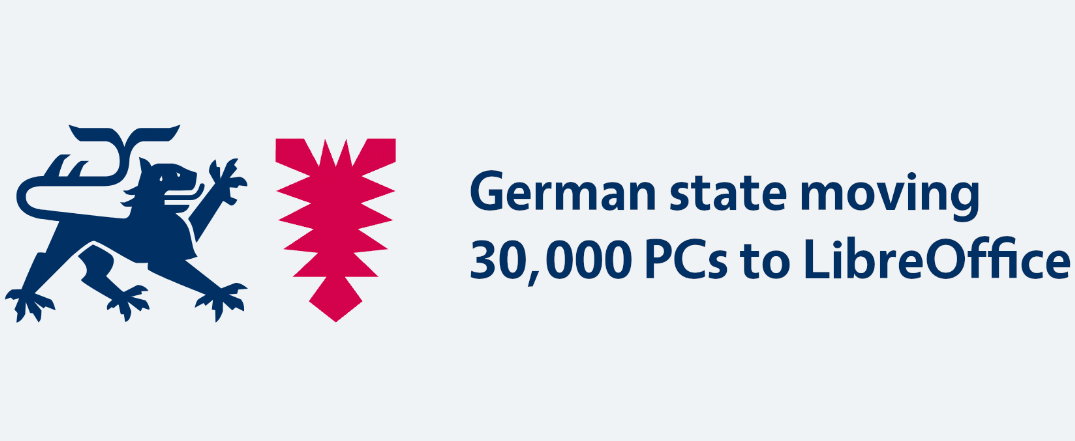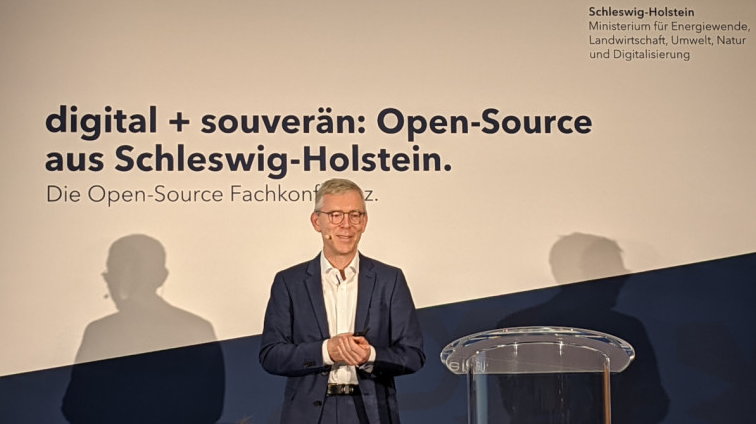The state of Schleswig-Holstein, located in northern Germany, moves 30,000 computers governments from Microsoft Office to LibreOffice and later from Windows to Linux. A significant commitment to open source software that will remind some of the “Munich case”, pioneering, if unsuccessful, if overcome, as different administrations bet on this type of software.
Software migration will begin with the transition from Microsoft Office to LibreOffice and is the result of a a successful pilot project implemented in the region, which will be completed in 2027 with another major step: the migration of thousands of computers from Windows to Linux.
Those responsible for the German state will place the main benefits of these changes in several areas: reducing licensing costs associated with the Microsoft suite of products; achieving data sovereignty by not transferring personal data outside the European Union and supporting the open format of ODF documents to maintain compatibility with other platforms and applications.
From Microsoft Office to LibreOffice
The state website contains the full announcement (in German), which begins with the regional president’s institutional statement: “Independent, sustainable and secure: Schleswig-Holstein will be a pioneering region in digital and the first German state to introduce a digitally sovereign IT workplace in its state administration. With Cabinet’s decision to introduce the open source LibreOffice software as a standard office solution across the board, the government has given its nod to the first step towards full digital sovereignty in the state, with more to come..
Shift to open source solutions “It is an important element for preserve digital sovereignty«, they warn. Using open source software also benefits from increased IT security, cost efficiency, data protection and better collaboration between different systems. In addition to developing the necessary open source applications, the goal is also to publish future development results under free licenses.

Those responsible for the Free Software Project in Schleswig-Holstein have defined six pillars on which it is built to achieve the proposed goal “digitally sovereign IT workplace”:
- Change Microsoft Office to LibreOffice.
- Change the operating system from Windows to Linux.
- Cooperation within the state administration and with third parties: Use of open source products Nextcloud, Open Xchange/Thunderbird together with the Univention AD connector to replace Microsoft Sharepoint and Microsoft Exchange/Outlook.
- Concept of an open source directory service to replace Microsoft Active Directory.
- List of specialized practices related to compatibility and interoperability with LibreOffice and Linux.
- Development of an open source telephony solution to replace Telekom-Flsport.
It’s no secret that the project has potential set a precedent so other governing bodies bet on open source software. It will not be easy, as we saw in the famous Munich case, for many reasons. Microsoft software largely dominates the IT infrastructure of most governments in the Western world. However, this same case has spurred similar programs in dozens of European administrations, such as the German region in question.
Those responsible assure it The Munich case will not be repeated. referring to a potential return to reusing Microsoft software. “The main problem in Munich was staff training”, explained the state’s digital manager. «In this case, we will do better. We plan long transition phases with parallel use and open source implementation step by step and only when the departments are ready. That way, people will be able to see that it works.”.
Open software in public administration?
Defenders of the Open Source movement believe that all public organizations should use open source software under the principle that “If software is publicly funded, its code should be open source”. If alternative uses are available, as is the case, as both LibreOffice and Linux are developments with great potential for use in public administration.
And this type of open software is a natural option that goes beyond cost savings and should be the norm in any administration that strives to solutions based on open standards, interoperability and reusable componentssome components, which incidentally are the goals pursued in the new digital strategy of the European Commission.
And there are other no less minor advantages, such as transparency and privacy. Moving to an open source solution does not guarantee that personal data will not be leaked, but it does ensure that problems with IT systems can be fixed quickly, which is not the case with closed source products.
Moreover, publicly funded software that is released as open source can be used by different departments and even different governments to solve similar problems. This opens the way feedback and collaborationit creates better code and faster innovation.
Of course, open source code is automatically available to the people who paid for it (contributors) and can be improved quickly, as being open and reviewed by thousands of third-party developers can allow suggestions for improvements, bugs or developments. to produce new applications.

These benefits are highlighted in Schleswig-Holstein as motivation for switching from Microsoft Office to LibreOffice and later from Windows to Linux, but there is more: “As a country we have a great responsibility to our citizens and businesses to ensure that their data is kept secure and we need to ensure that we are always in control of the IT solutions we use and that we can act independently as a state. Ensuring digital sovereignty is at least as important as energy sovereignty«says the head of Digitization of the German state.
The leader also draws attention to industrial policy orientation. “My vision of a strong digital location in Europe can become a reality, because we no longer need to spend our public budgets only on license fees, but rather invest in the real programming services of our national digital economy, creating value and jobs locally.” Our goal in expanding the common digital internal market is digitally sovereign solutions and services that we connect. As a government, we use a treasure trove of data to deliver open innovation, digital value chains and prosperity at home.”.
Undoubtedly. The Schleswig-Holstein project is quite an example for those who believe that using open source software should be the norm in public organizations. As well as the use of open document formats such as ODF, which this project also supports. In general, Open Source is an unstoppable phenomenon that no one (not even the big producers of proprietary software) wants to stay away from, but there is still work to be done in the public administration that we all pay for.















